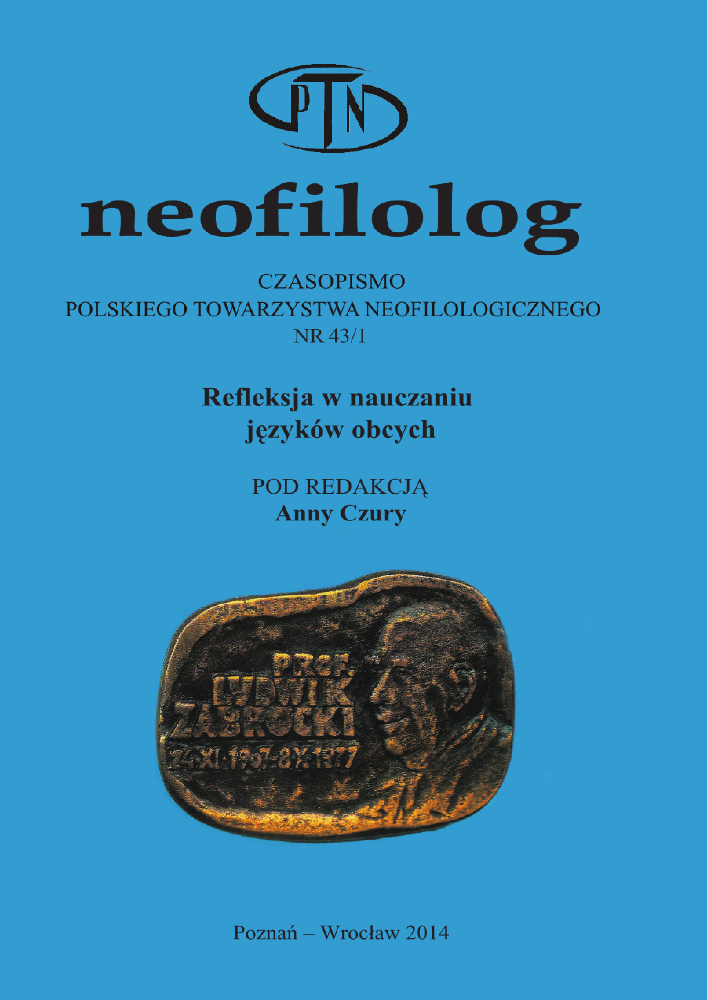Résumé
This article aims to discuss the problem of a relationship between reflection and identification in the community of EFL teaching practitioners. The basic tenet is that reflection enables individuals to construct and supply reification to community knowledge, which, in turn, allows for their identification as legitimate members of the community. Identity is neither static nor pre-given. It is built as one moves through life and changes according to one’s environmental needs, one’s interests and interactions. To expound and exemplify these tenets, two samples of conversations in a community of language teaching practitioners are analyzed. The analysis aspires to reveal a dialectic relationship between the processes of reflection and identification.Références
Bamberg, M. 2000. „Critical personalism, language, and development”. Theory & Psychology 10: 749-767.
Bamberg, M. 2011. „Narrative discourse” (w:) The Encyclopedia of Applied Linguistics (red. C. A. Chapelle). Oxford: Wiley-Blackwell: 4157-4163.
Beck, U. 2002. Społeczeństwo ryzyka. W drodze do innej rzeczywistości. Przeł. S. Cieśla. Warszawa: Wydawnictwo Naukowe Scholar.
Bendkowski, J. 2012. Interaktywno-sieciowy model kształtowania wspólnot działań w kreowaniu i dyfuzji wiedzy w organizacjach. Gliwice: Wydawnictwo Politechniki Śląskiej.
Bokszański, Z. 1989. Tożsamość, integracja, grupa. Łódź: Wydawnictwo Uniwersytetu Łódzkiego.
Brazelton, J. i G. A. Gorry. 2003. „Creating a knowledge sharing community: If you build it, will they come?”. Communications of the ACM 3(1): 23-25.
Cackowski, Z. 1992. „Przeszkoda epistemologiczna”. Kwartalnik Pedagogiczny 1(141): 3-14.
Enkel, E., P. Heinold, J. Hofer-Alfeis i Y. Wicky. 2002. „The power of communities: How to build knowledge management on a corporate level using a bottom-up approach” (w:) Knowledge Management Case Book: Siemens Best Practices (red. T. Davenport i G. J. B. Probst). New York: Wiley & Sons: 108-127.
Erikson, E. H. 1968. Identity, Youth and Crisis. New York: Norton and Co.
Gabryś-Barker, D. 2012. Reflectivity in Pre-service Teacher Education. A Survey of Theory and Practice. Katowice: Wydawnictwo Uniwersytetu Śląskiego.
Gach, D. 2007. „Wspólnoty praktyki” (w:) Podstawy zarządzania przedsiębiorstwem w gospodarce opartej na wiedzy (red. B. Mikuła, A. Pietruszka-Ortyl i A. Potocki) Warszawa: Difin: 251-254
Gee, J. P. 2010. Introduction to Discourse Analysis: Theory and Method (3rd ed.). London: Routledge.
Giddens, A. 1991. Modernity and Selfidentity. Cambridge, MA: Polity Press.
Jenkins, R. 2008. Social Identity (3rd ed.). London: Routledge.
Kubiak, K. 2008. „Lokalne i globalne wspólnoty praktyków w przedsiębiorstwie sektora high-tech” (w:) Scenariusze, dialogi i procesy zarządzania wiedzą (red. K. Perechuda i M. Sobińska) Warszawa: Difin.
Kwiatkowska, H. 2005. Tożsamość nauczycieli. Między anomią a autonomią. Gdańsk: GWP.
Lave, J. i E. Wenger. 1991. Situated Learning: Legitimate Peripheral Participation. Cambridge: Cambridge University Press.
Lortie, D. C. 1975. Schoolteacher: A Sociological Study. Chicago: University of Chicago Press.
Mead, G. 1934. Mind, Self and Society. Chicago: The University of Chicago Press.
Schön, D. A. 1983. The Reflective Practitioner. How Professionals Think in Action. New York: Basic Books Inc.
Scollon, R. i S. W. Scollon. 2001. Intercultural Communication. A Discourse Approach (2nd ed.). Oxford: Wiley-Blackwell.
Tajfel, H. 1982. Social Identity and Intergroup Relations. Cambridge: Cambridge University Press.
Tajfel, H. i J. C. Turner. 1979. „An integrative theory of intergroup conflict” (w:) The Social Psychology of Intergroup Relations (red. W. G. Austin i S. Worchel). Monterey, CA: Brooks/Cole: 33-47.
Wenger, E. 1998. Communities of Practice. Learning, Meaning and Identity. Cambridge: Cambridge University Press.
Licence
© Kamila Ciepiela 2019

Ce travail est disponible sous licence Creative Commons Attribution - Pas de Modification 4.0 International.
Auteurs :
Les auteurs de textes acceptés pour publication dans la revue Neofilolog sont tenus de remplir, signer et renvoyer à l'adresse de la rédaction, un accord sur l'octroi d'une licence gratuite pour les œuvres, avec obligation d'accorder une sous-licence CC.
En vertu de cet accord, les auteurs des textes publiés dans la revue Neofilolog accordent à l'Université Adam Mickiewicz de Poznań une licence non exclusive et gratuite et permettent l'utilisation de la sous-licence Creative Commons Attribution-NoDerivatives 4.0 International (CC BY-ND 4.0).
Les auteurs se réservent le droit de disposer librement de l'œuvre.
Utilisateurs :
Les utilisateurs d'Internet intéressés ont le droit d'utiliser les œuvres publiées à partir de l'année 2017 sous réserve des conditions suivantes :
- reconnaissance de la qualité d'auteur - l'obligation de fournir des informations sur la qualité d'auteur, le titre, la source (liens vers l'œuvre originale, DOI) et la licence, ainsi que l'œuvre distribuée ;
- sans créer d'œuvres dérivées - l'œuvre doit être conservée dans sa forme originale, p. ex. les traductions ou les interprétations ne peuvent être distribuées sans le consentement de l'auteur.
Tous les textes publiés sont soumis au droit d'auteur.
Autres :
L'Université Adam Mickiewicz de Poznań se réserve le droit à la revue dans son ensemble (mise en page, forme graphique, titre, conception de la couverture, logo, etc.).
.
